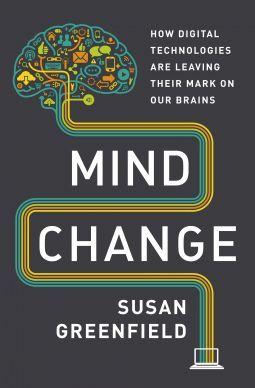We only have to look at the human evolution to agree that we are adaptable. We may not instantly change colors, but we do gradually adapt to weather conditions and the environment we live in. The synaptic networks in an infant are like creepers and they grow randomly in each individual, which eventually makes one person different from others.
In Mind Change: How Digital Technologies Are Leaving Their Mark on Our Brains, Susan Greenfield raises some very important questions about the effects of long use of electronic devices on the Millennials. Susan Greenfield is a senior research fellow at Lincoln College, Oxford University, an honorary fellow of the Rocal College of Physicians, and a member of the House of Lords. She is also the bestselling author of books like The Private Life of the Brain, Tomorrow’s People, and ID: A Quest for Meaning in the 21st Century.
 Mind Change: How Digital Technologies Are Leaving Their Mark on Our Brains
Mind Change: How Digital Technologies Are Leaving Their Mark on Our Brains
Author: Susan Greenfield Pages: 368 pages Publisher: Random House (February 10, 2015) ISBN-10: 0812993829, 978-0812993820
The first couple of chapters of Mind Change introduces readers to the dangers of what increased engagement with devices, online or otherwise, can have on kids and teenagers. The author cites research and findings from different researchers who claim that playing video games and spending long hours in front of the screen online can significantly change how we perceive things.
Our brain is the most significant organ of our body and separates us from rest of the animal kingdom. We have been able to tame Tigers and constrain Elephants not because we are stronger, quicker, or because of some other physical attribute. In How Brain Works and the next few chapters, the author gives you a primer on how human brain has evolved and some theories of consciousness to explain why it is important to realize that increased time in front of a screen can alter the way we or earlier generations saw things differently from the current digital natives.
With an example of London taxi drivers, the author shows that a specific activity performed consistently over time can influence how our brain develops and physically changes to accommodate the specific requirements of the activity. The author further explores the development of brain and how different parts of our brain communicate with each other. In context of why increased screen activity can change our minds, the author points out that over development of the reward and thrill centers before the parts of brain that help us control these primitive urges, can have long lasting changes in people.
After acquainting the reader with the things that affect our behavior through the Brain-Mind-Consciousness lens, the author then begins to examine how each of the new, highly stimulating computer related activities influence the development of children and adolescents.
The author takes a detailed look at how social networking has evolved in the last decade and become mainstream for people from almost all age groups. However, she warns that the generation that grew up interacting with other people mainly online risks losing some basic communication skills required in the real world. She points out that increased online communication will hamper users’ ability to read emotions and other nonverbal cues present in face-to-face communication. Emotional intelligence is key to social success. The absence of facial expressions, touch, and body movement in online communication inhibits the ability to learn these signs. The digital natives then may not develop these key skills and strip face-to-face communication of vital information transfer.
Mind Change puts forward a compelling narrative supported with research and facts to warn us about the long-term effects of our screen-centric behavior. We cannot stop evolution, that is what has brought us here. Rapid technological changes will surely change what is to come ahead. The question is, are we better equipped now than centuries ago to understand what actions are likely to give what results? If so, the future that increased dependence on devices gives, may not be progressive.
Loss of empathy, reduced pre-frontal cortex activity, and desire for instant answers with online search will reverse the changes that our brains have undergone in the last thousands of years. Instead of a thinking and inventing being, future human beings will be no better than robots that merely react to external stimuli.